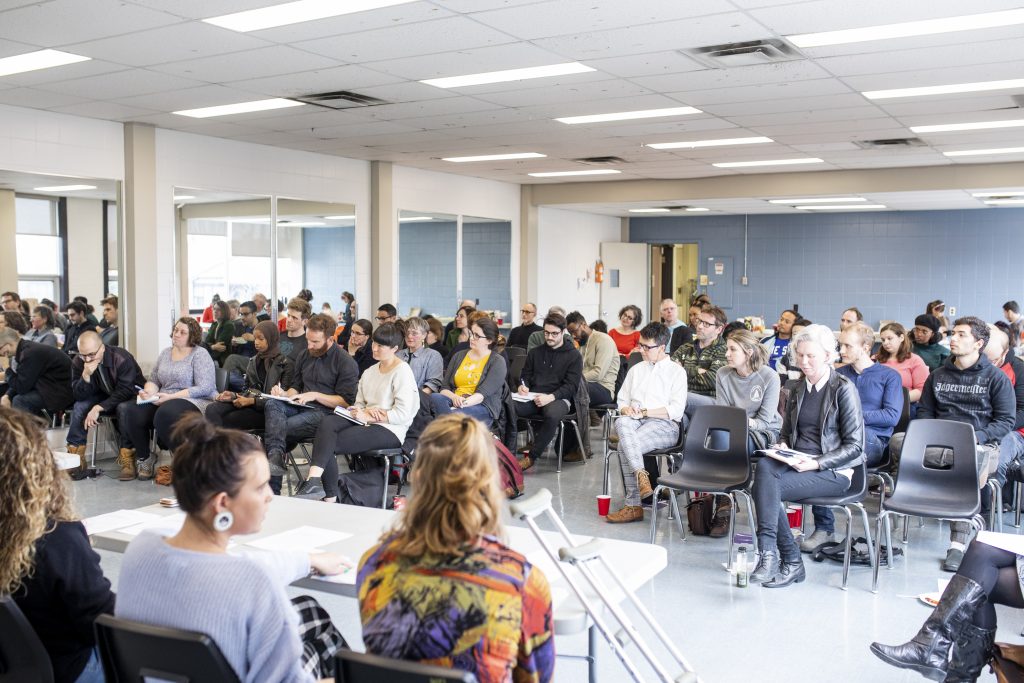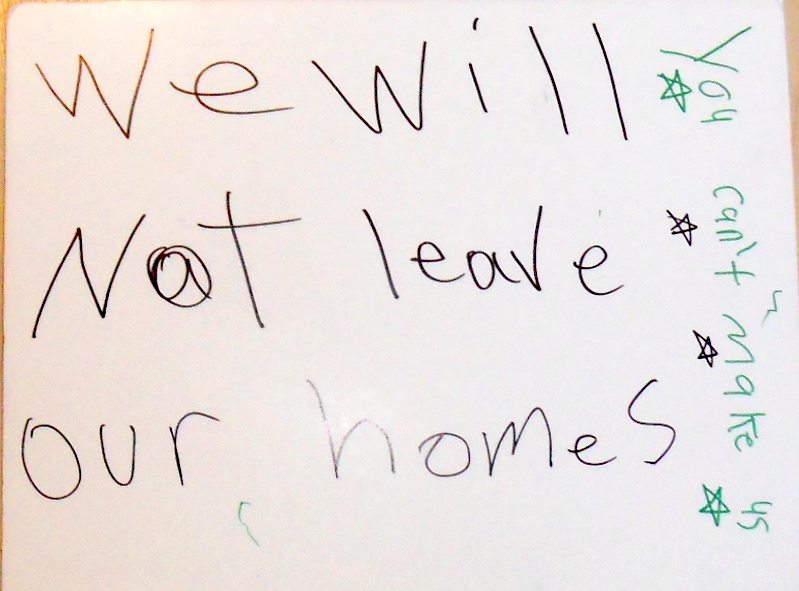Carleton Profs and Students Research Recent Herongate Evictions
The community of Herongate has been a vibrant and affordable family neighbourhood for nearly six decades. People made their lives there, raised their children there, but that is over now.

A packed room at a Spring 2019 community event titled: Evicted from Home? The (White) Right to the City and the Struggle for Herongate
“I have been a resident of Herongate for five years, and it is a beautiful place to live,” Herongate resident, Tammy Mast, said at a late April panel event titled Evicted from Home? The (White) Right to the City and the Struggle for Herongate held by members of the Carleton community and The Herongate Tenant Coalition.
Since being acquired by Timbercreek in 2012, a company self-described as “an active investor, owner and manager of global real estate and related assets focused on delivering sustainable and growing returns to our investors,” nearly all 236 affordable townhouse rental units have been destroyed in preparation for exclusive luxury apartments. Recognizing the growing enchantment of the upper class for the Alta Vista area and the potential profit margins, critics say Timbercreek’s redevelopment has left hundreds of low-income families scrambling for new housing and mourning the loss of their distinctive Herongate community.
All of this begs the question: Why, in the capital of Canada, has this been able to happen?
“In 2002, I moved to Ottawa from Alberta,” says Mast. “I lived in a number of neighbourhoods around Ottawa, but it wasn’t until I moved to Herongate in 2014 that Ottawa really began to feel like home. This is despite the fact that I am demographically and culturally very different from most of my neighbours here in Herongate – a true demonstration that Herongate is a vibrant and welcoming community. For a lot of terrible reasons like systemic racism and corporate efforts to dictate a narrative that serves their own interests, there existed an outsider stigma about this place, but that is a sham. Herongate was wonderful.”
Under current trends, the “price of doing business” for corporations like Timbercreek are increasingly paid by low-income and racialized tenants across Canada. Before the evictions in September 2018, this was a community disproportionately comprised of recent immigrants and racialized people in Canada’s capital. Remarkably, 90 per cent of the 500 family members evicted from Herongate last year were visible minorities. Now only rubble remains after the speedy demolition of the Herongate townhouses between Baycrest and Sandalwood along Heron Road.
Carleton Profs Work in Collaboration with Residents and Herongate Tenant Coalition
Carleton professors Jacqueline Kennelly, Department of Sociology and Anthropology, and Jennifer Ridgley, Department of Geography and Environmental Studies, have been working in collaboration with the Herongate Tenant Coalition and evicted residents on researching the causes and consequences of what has been termed the “demo-viction” (demolition-driven eviction) of the Herongate residents by Timbercreek Asset Management Corp. They are also examiningthe role of the City of Ottawa in facilitating and enabling those evictions.
“I’ve been working on housing and homelessness issues in Canada and the UK for over a decade,” says Kennelly. “I live in Alta Vista, across the road from Herongate. When I found out what was happening, I got in touch with the Herongate Tenant Coalition. We began to talk about what Carleton could do to support their advocacy work and shed light on the issues that led to this abuse of human rights, practically in the backyard of Canada’s seat of government.”

While it is, of course, legal to purchase property and then evict, it is lawfully required in Canada that the developer do what is necessary to preserve social and racial composition up to the point of preventable suffering. Landlords must also maintain sufficient accommodation for their tenants — the right to adequate housing is, after all, a human right.
A recent human rights complaint launched by 14 former Herongate residents with the Ontario Human Rights Tribunal against both Timbercreek and the City of Ottawa argues that neither party fulfilled this legal and ethical obligation.
The complaint says that Timbercreek engaged in racially discriminatory practices and that they strategically allowed their units to deteriorate into a state of disrepair (while occupied by paying tenants) to justify demolition, with the complicity of the City of Ottawa.
As a society, we need to prioritize housing as a human right
According to the complaint, the City of Ottawa’s actions, or lack thereof, mean they bear considerable responsibility for the destruction of a vital and vibrant community for systemically disadvantaged people in a housing market unwilling to cater to those with lower wages.
Research indicates that the average income of households in the Herongate community is $41,000 annually before taxes. Simply put, evicting Herongate residents means that Timbercreek likely sent at least some of them into homelessness, critics say.
“The social housing registry in the City of Ottawa has a 10-year waiting list for family units and Ottawa, like the rest of Canada, is in the midst of a growing homelessness crisis. The fastest growing homeless population in the city is families, according to the city’s own statistics,” explains Kennelly.
The System is Powerful and Discriminatory
Panelist at the Evicted from Home? event, Prof. Ted Rutland in the Department of Geography, Planning, and Environment at Concordia University and story_intro_author of Displacing Blackness: Planning, Power, and Race in Twentieth-century Halifax, informed the at-capacity audience that Herongate has become an international case study of the insolent way in which corporations work in tandem with a complicit and racist state.

“The poor and racialized live in horrible conditions, thanks to uncaring property owners, for years and years.”
“They keep the space cheap for landlords until gentrification and enterprise is ready to occur, then they’re kicked to the curb. Herongate is similar to what we’ve seen in Harlem over the last 20 years.”
Alarmingly, there exists so little societal and bureaucratic pressure that Timbercreek did not even feel the need to conceal their plan.
“It was pretty obvious what the developer was doing,” says a neighbour close to the community who asked to remain anonymous. “I’ve lived here for a long time and over the past few years, I began to notice lawns in Herongate were unkept, shingles were peeling back, and trash cans weren’t emptied. The windows and screen doors on all the units were also quite obviously in a state of disarray and needed repair.”
Mumina Egal, a community organizer and a member of the Herongate Tenant Coalition, explained at the April event that many residences had significantly cracked windows, so occupants were freezing cold through the winters.
“Residents were forced to live in unlivable conditions, all thanks to Timbercreek’s successful pursuit to justify the ruin of our community,” says Egal.
“There were hundreds of complaints from residents to Timbercreek on everything from broken doors to bug infestations. Nearly all went unanswered, and there was no on-the-ground response.”
A student in Prof. Kennelly’s graduate course SOCI 5806: Urban Inequality, Hanna Stewart, says she uncovered in her research that when Timbercreek did decide to respond, staff exhibited a shocking impertinence. Stewart found that Herongate residents experienced Timbercreek staff as disrespectful, particularly to the non-English speaking tenants who told stories of being patronized and pressured to move without knowing their rights.
The research of Olivia Stavretis, another student in Kennelly’s graduate course, explains that provincial and municipal policies relating to landlord-tenant relations are vague and not accessible to tenants. This empowers corporate landlords like Timbercreek to circumvent their obligations to maintain units, and to get away with inflating the cost of rent.
All of this begs the question: Why, in the capital of Canada, has this been able to happen?
“Our research raises important questions about the role that racism and stigma play in the development processes here in Ottawa,” says Prof. Ridgley. “Why were the landlords permitted to ignore basic maintenance responsibilities and disrespect residents for so long? Why has there been so little public outcry in the rest of the city?”
Catherine McKenney, city councillor for Somerset Ward (not Herongate’s Ward) and council liaison for Housing and Homelessness was also a panelist at the Evicted from Home? event, and she followed the same line of interrogation as Ridgley.
“The Ottawa area floods are tragic and important, but compare the non-stop media coverage and political attention of the flooding of these waterfront properties to the minimal coverage of the December 2018 Vanier fire which had life-altering consequences for more than 200 low-income residents. There’s a stark difference,” says Councillor McKenney.

So much has been unjustly taken from people without the means to adequately defend themselves and, in large part, they are silenced by potent forces, critics say.
“In neighbourhoods like Herongate, poor and working-class people and immigrants come together to support each other, often in the face of neglect from the city and exploitation by landlords. We have heard stories of residents helping each other with child care, translation, transportation, and all kinds of financial, social and emotional supports that help create vibrant and healthy communities,” says Ridgley.
“In addition to people losing their homes, these supports are also being disrupted when mass evictions occur, causing considerable mental and physical harm through humiliation, uncertainty, and grief.”

Graduate student Charlotte Smith’s research points out the profound impact the Herongate expulsions will have on children. Smith’s work reveals that local schools were aware of the evictions but did not take any specific measures to support affected students. This is part of a larger problem of schools not being equipped to respond to youth who are homeless or facing homelessness, despite the stated policy goals of school boards and the Ministry of Education to support the “whole student” and be mindful of other issues such as mental health challenges, bullying, and more.
It is likely that bold-faced theft of a necessary community would have gone almost entirely unnoticed without the relentless work of groups like the Herongate Tenant Coalition and other concerned and in-the-know citizens.
Ridgley reminds us that it is important to appreciate that this is happening to neighbours in our own backyard.
“This is an issue that is impacting the Carleton University community directly. Some of my students lived and grew up in the neighbourhood, and I have students who are actively supporting friends and family members who are struggling because of these evictions. It is something all of us at Carleton should be concerned about,” she says.

Timbercreek’s Response to Advocacy for Evicted Residents
“Timbercreek is now promising up to 20 per cent affordable housing in the redevelopment, offering it as a ‘social contract’ that is not legally binding,” says Prof. Kennelly.
“This is likely the result of the global outcry that these demo-victions spurred, thanks in large part to the organizing work of the small but mighty Herongate Tenant Coalition. The Herongate evictions are now featured in a recent documentary created by UN Special Rapporteur on Affordable Housing, Leilani Farha. They have been reported on by media from across Canada and in the United States and by global media giant, Al-Jazeera,” says Kennelly.
A student in Kennelly’s course, Andy Crosby, discovered Timbercreek lawyers sent a legal letter to Twitter asking the popular social media site to disable the Herongate Tenant Coalition’s account. In the letter, Timbercreek’s lawyers described Coalition members as “unstable, unhinged, and extremist.” This kind of incendiary language deepens the racist stigma already faced by the neighbourhood. Criminalizing the Herongate Tenant Coalition has been one of their overarching approaches.

The Larger Consequences of Gentrification in the Nation’s Capital
The Herongate evictions are a vicious uppercut in the greater fight for affordable housing in Ottawa and Canada, says Kennelly.
“The City of Ottawa has a 10-year plan to end homelessness, which they are in the process of renewing. So far, it hasn’t been working. While they’re housing chronically homeless people at higher rates than ever before, there is very little happening to stem the flow of people into homelessness.
“These evictions should never have happened in a city like Ottawa. Rental availability is at an all-time low, housing and rental prices are sky-rocketing, and yet the city allowed 150 affordable townhouses to be demolished? It makes no sense.”
Timbercreek’s website states:
“We maximize value by employing a value-oriented investment philosophy combined with an active, hands-on asset management platform, to identify opportunities that will generate predictable and sustainable long-term cash flow. We have earned a reputation for providing conservatively managed, risk-averse investment opportunities for both retail and institutional investors.”
“As a society, we need to prioritize housing as a human right,” says Kennelly. “We shouldn’t be approaching it as an investment opportunity, and we absolutely cannot rely on investment firms to provide affordable housing. Ensuring a sufficient stock of affordable housing ought to be the job of government.”
In her opening remarks at the Evicted from Home? The (White) Right to the City and the Struggle for Herongate event, Prof. Ridgley began by acknowledging that the event was occurring on the traditional unceded territories of the Algonquin people.
“I would like to invite everyone to pause for a moment to reflect on how that might shape our understanding, our research, our organizing work, and our responses to the mass evictions and displacement of the Herongate community – a largely working class, racialized and immigrant community,” said Ridgley.